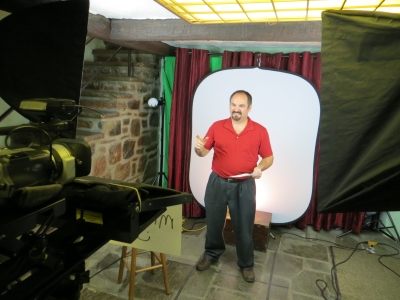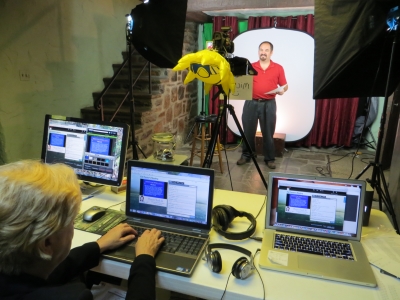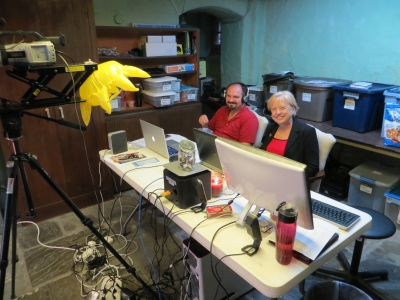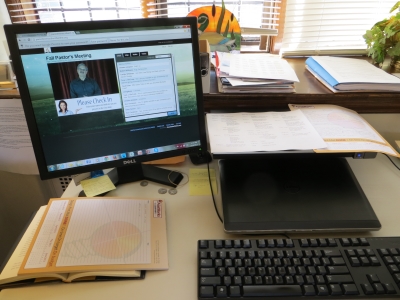Why Pennsylvania Conference Pastors Meet in Cyberspace
Interview by Taashi Rowe

Tim Madding, Pennsylvania Conference’s director of Leadership and Spiritual Growth, addresses an online audience of pastors.
The Pennsylvania Conference is among several Columbia Union entities using video conferencing to reduce travel, costs and conflicting schedules. Some 30 pastors “attended” their recent fall meeting, which marked their one-year anniversary of holding these meetings online. We recently talked with Tim Madding, the conference’s director of Leadership and Spiritual Growth, to find out exactly how it all works.
Visitor: What motivated Pennsylvania Conference leaders to host some meetings virtually?
Madding: We have had two scheduled one-day pastors meetings throughout the year. These meetings were designed to be an opportunity to connect with the pastors, giving them encouragement, resources and updates from the various office departments and officers regarding programs, updated policies and procedures. Though we [would] meet in a central location, … some lived so far away, they would have to travel in the night before, often staying in a hotel. Personnel from the office, who might be coming to make a short presentation, would have to travel hours just to convey a 20-minute presentation.
After doing a couple of these one-day pastors meetings, I noticed that the meeting were heavy in informational content—the pastors primarily sat all day listening to a guest speaker and office personnel deliver content. Then, after a full day of information, they would have to drive hours home. All this information was valuable and appreciated, but a lot of time and money was spent for travel.
Visitor: Do you ever have a chance to meet with the pastors in person?
Madding: We have other meetings and events where there is more personal interaction between the pastors. We have overnight meetings in January and at camp meeting where there is more time for fellowship. We have monthly, regional meetings where there is more time spent in sharing, prayer and fellowship.
Visitor: What are some of the benefits to hosting meetings online?
Madding: Because we can pre-record content before the actual meeting, I can set up appointments with [speakers] to share with our pastors. Some of these appointments are via Skype where I interview them [about] what they can do to assist pastors. I was able to interview Joseph Kidder from Andrews University about his latest book, The Big Four. I met on Skype with Thomas Beihl sharing how his interest-tracking software, Disciples, can help pastors in Pennsylvania. For this last meeting, I flew Richard Choi, PhD—chair of New Testament at the Seventh-day Adventist Theological Seminary at Andrews University—here to pre-record a “class” on the subject of the Trinity. We used two cameras with a small studio audience as he lectured.
With all of this pre-recorded content, we are able to schedule the day down to the minute. The final element is actual live content.
 Visitor: Are participants able to interact with speakers?
Visitor: Are participants able to interact with speakers?
Madding: While the pastors view the content in the comfort of their homes, and maybe even pajamas, they are able to connect via chat. As they watch the presentations, they can ask questions or share additional feedback, giving their perspective. In most cases, because the day is scheduled, the various presenters are able to be online via chat while their presentations are being broadcast. So when a pastor has a question, the questions can be answered live. Presenters may be online in their office or home in another part of the country yet are interacting live with the pastors.
Visitor: How do you know that people are actually “attending” these meetings?
Madding: [We take] attendance. At the beginning of the broadcast and at various times throughout, pastors “check in” by indicating their presence in the chat field. Because the entire broadcast is recorded (both pre-recorded material and live feed), pastors [who] were unable to attend can watch the entire pastor’s meeting online at a later time. By doing this, almost all of our pastors attend during the live broadcast. However, with it being recorded and online, every pastor gets the content.
Visitor: What software do you use?
Madding: We utilize Church Online Platform to deliver the content. It features an embedded video area for your message and music, a slide area for graphics we upload, a way for people to request live prayer, social media connections and tab options, including chat, visitor map, sermon notes and other text. To embed the video we use Ustream.
Visitor: How else are you using this software?
Madding: With the success of these meetings (everyone loves it), we have chosen to utilize the technology in other ways. At times, we have had to deliver critical information to the conference employees that an email wouldn’t adequately accomplish. We’ve sent an email out to the employees letting them know to be online at a specific time. Then we are able to communicate with them concerning the issue. Being live, employees can text questions or comments in the chat field, giving us the opportunity to clarify issues.
Visitor: Any plans to use the software to interact with local church members?
Madding: We are also looking at having several conference training events throughout 2014, where members can come together in their churches or homes for this live training. We are bringing John Bradshaw, speaker and director of It Is Written in for a day of revival in January. We are encouraging the membership to meet in homes or churches throughout the conference for this day of revival and prayer.

Tim Madding and Jeanne Hartwell, the associate Ministerial director, lead the meetings.

Pastors can “check-in” to watch and participate in the meetings live.

Add new comment